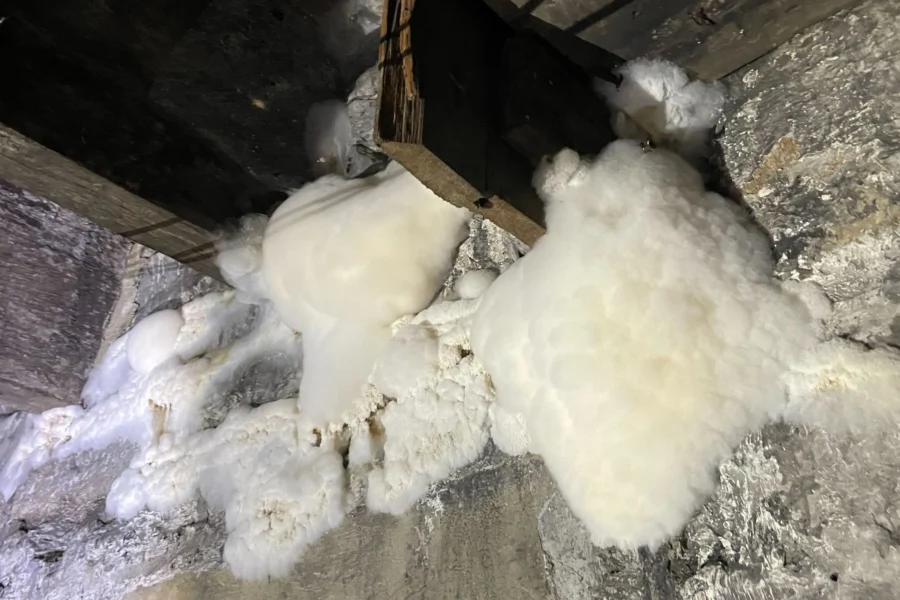Purchasing a home takes a lot of research and resources to ensure you’re making a good investment. The housing market can be risky because you can never be 100% aware of all the problems that may be in store for the future. It’s a fact of homeownership that some repairs will be needed over time and ongoing maintenance is a must, however, most people minimize the element of surprise at the time of purchase by making sure they employ a home inspector to evaluate the home.
While a home inspection is vital and sometimes required in order to receive funding from your lender, it may not be enough to ensure you are making a good purchase. The home inspector doesn’t usually address any mold issues or the possibility of mold growth in the future when conducting his inspection. In fact, many home inspectors exclude mold explicitly in their contracts to protect themselves from future liability. This means that it’s possible your dream home could turn into a nightmare if mold or moisture issues aren’t addressed or remain hidden throughout the buying process.
Consider Hiring a Mold Expert
It’s unlikely that mold in and of itself will cause serious structural damage to a home although the conditions present for mold to develop can lead to other obvious structural issues like wood rot. Sometimes, this means surface mold growth can be easily covered up. It’s hard to believe that anyone would hide a known problem, but it is something that happens. A seller’s disclosure should include any known mold problems, but proving that a seller knows about mold in their home and that it was a health problem can be challenging and very expensive once the deal is done. Getting a Mold Specialists opinion on your potential home before you make a purchase may be a good choice, especially if you have known health problems or allergies that make you more susceptible to mold.
Whether a home is new or old, mold can be a potential problem. Older homes have years of use that often includes water damage events like the bathtub overflowing or sump pumps failing. Newly built homes often have moisture control issues during construction that can lead to mold growth on structural framing or other materials. A mold expert is best equipped to identify areas of concern and let you know how much, if any, visible mold damage is present. All homes have some mold in them, determining what is normal or acceptable can be a challenging task, one that often requires a bit more experience and knowledge than the average home inspector, realtor or friend has to offer.
Things to look for yourself.
While a mold inspection for your soon to be home is something you may decide to do before closing the deal, you can rule out many problems and even a few homes yourself by using the following tips.
- Avoid homes with musty odors. Mold produces VOCs (volatile organic compounds) that your nose interprets as a “musty” smell. If a home smells musty or “mildewy” there’s likely a mold source somewhere causing the odor. The stronger the musty smell, the more likely that the mold problem is either large or active.
- Look for evidence of poor cleaning habits. Mold needs three things to really thrive: moisture, a food source, and warmth. All of these ingredients are often present in homes, even if things are kept reasonably dry. When dust and grime are allowed to build up on interior surfaces and contents mold is more likely to become a widespread problem throughout the home. Observe window casings, under the refrigerator and behind heavy furniture. If there is a lot of accumulated debris or dust, it’s more likely that mold and other allergens will be present.
- Check for evidence of past water problems. Run the faucet and open the cabinet where the facet runs to see what you find. Don’t be shy this may be your home one day. Look for swollen baseboards, water spots and stains, or bowed and buckling floors. Water damage rarely happens without evidence. Past water problems are not always an indication of a mold problem, but they could be a clue.
- Be suspicious of homes that smell too clean or have heavy fragrances present. Sometimes homeowners will make simple and quick touch-ups changes to increase the value of their home. If a basement smells strongly of bleach or there is a strong floral scent in the air, it could be that the seller is simply putting their best foot forward or it could mean that they are trying to hide an odor problem.
- Look past the new finishes. Prepping a home for sale often involves renovations. If every wall is freshly painted and there is new flooring throughout, look deeper and see if there are underlying problems or if the workmanship is questionable. Look in corners, inside closets, under cabinets or any other hard to reach areas. Legitimate renovators won’t leave problems unfixed knowingly, but it’s often easy to spot a home where corners were cut and the chances of a hidden problem are higher.
While these tips shouldn’t replace a normal home inspection or a mold expert from inspecting the home you are purchasing, they do come in handy on your journey to narrowing down your prospects. As always, Indiana Mold Remediation is here to help if you have any questions or would like to schedule and inspection for your prospective new home.



